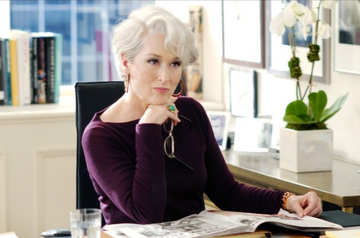Why Women Are Often Forced To Be More Stringent And Less Empathetic As Bosses
Often considered as nurturers, women are expected to have soft and emotional personalities. This is perhaps the reason why decisive female bosses are termed as ‘bossy,’ ‘bitchy’ or ‘horrible’. This stereotyping also extends to their portrayal in Hollywood. Movies like The Devil Wears Prada or The Proposal show the female boss as cold and heartless. Turning to real life, you can find Hillary Clinton being blamed for ‘scrubbing out femininity, vulnerability and heart’ or Yahoo employees describing their CEO Marissa Mayer as ‘cold’ and ‘unwilling to listen’.
Sometimes they just have to be firm!
I came across this stereotype for the first time when one of my female friends commented on the same in our chat. At that time, I was in the initial phase of my career and had no idea about this stereotyping. Hence, I just brushed it away. However, over a period of time I realized that the world indeed finds it difficult to take orders from a woman.
One of the most common stereotypes that we consciously or subconsciously associate with a woman at the workplace is that her family and kids are of primary importance to her and her career takes a backseat as soon as she gets married. Another common belief is that a woman cannot handle tough or tricky situations as she is too soft. I actually witnessed the latter one when my male boss, (now an ex-boss), denied me the opportunity to lead and directly interact with one of our clients. He said, “I feel you might not be able to handle the pressure and end up crying.”
I didn’t realise at the time that it was a common gender stereotype and that my calm demeanour was being termed as ‘too soft’. So if you ask me whether women sometimes tend to be more stringent at work, I’d say yes, they have to because otherwise they are denied opportunities.
Is there any psychology or science behind this stereotype?
While trying to explore possible psychological explanations behind this stereotyping, I found that both women and men unconsciously associate men with leadership and female with following. Hence, if a woman rises up the ladder she disrupts the balance, even if unknowingly.
Dr. Heidi Grant Halvorson, social psychologist and author of No One Understands You and What to Do about It, says, “We learn that the stereotype of a woman is loving, caring, warm, and kind— but not particularly a go-getter”. She cites the example of Marilyn Monroe who is remembered throughout the world as a silly blonde but no one knows that she also wrote poetry and had a lot of depth. If we have difficult male CEOs like Steve Jobs or Jeff Bezos, it is okay. But such a woman will be termed incompetent and cold.
Real-life examples
Susan Fowler, ex-Uber engineer, recently disclosed how, despite being a high performer, she constantly struggled to have an upward career trajectory as also the company HR commenting ‘how sometimes certain people of certain genders and ethnic backgrounds were better suited for some jobs than others’.
The abrupt firing of Jill Abramson, the New York Times’ first female executive director is another such incident. It is speculated that despite being a talented and inspiring journalist, she was fired when she made enquiries on her pay not being comparable with her male counterparts. It was said that she was abrasive in her behaviour, much like a Hillary Clinton or a Marissa Mayer. Maybe her capability of making an impact in a male- dominated newsroom and editorial staff became the reason for her firing.
Changing trends
As per the S&P Global Market Intelligence report, 2016 recorded a rise in the number of women CEOs. Although the count is low with only 27 female CEOs in 500 companies, it has risen compared to 2015. Also, Timesjobs.com in their latest TJinsite Survey quoted the growing acceptance of female bosses in the media, entertainment, consumer durables, and FMCG companies. This gives us all some hope that the barrier of the female boss stereotype is slowly being overcome. Women’s struggle will be a little easier in the times to come.
I believe that traditionally feminine qualities like nurturing or caring increase a woman’s ability of being a good boss or a leader. It makes her capable of being considerate towards her employees and colleagues and helps in building good connections. Plus, she can balance being soft and stern as per the situation’s demands. After all, we women are multitasking every single day and every single moment of our life.
Written by Sonalika Arora
















